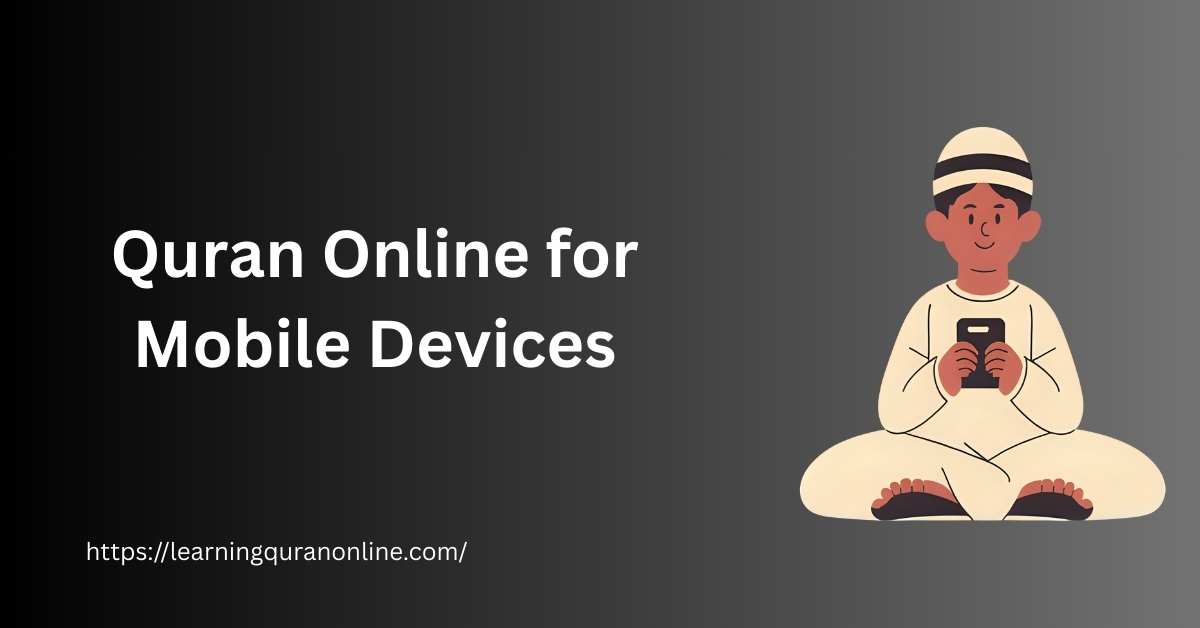In an era where smartphones are a constant companion, accessing the Quran online from mobile devices has transformed how Muslims learn, recite, and memorize the Quran. Whether you’re looking for a Quran app for Android or iOS, live online Quran classes with a qualified teacher, or interactive tools for Tajweed and Hifz, mobile solutions offer flexibility and powerful features that make consistent Quran study possible anywhere. This article explores the benefits, essential features, best practices, and tips to choose the right digital Quran experience for your mobile device.
Table of Contents
ToggleWhy Choose Quran Online for Mobile Devices?
Mobile Quran apps and online Quran platforms bring religious learning to the palm of your hand. They are ideal for busy people, travelers, students, and parents who want their children to learn Quran anytime, anywhere. With online Quran learning on mobile devices you get:
- Immediate access to the full Quran, translations and tafsir in multiple languages.
- Audio recitation by famous Qaris for tajweed practice and listening-based learning.
- Interactive lessons, live one-on-one classes, and group sessions for Quran study and Arabic learning.
- Tools for memorization (Hifz), progress tracking, and personalized study plans.
- Features like bookmarks, search, night mode, and offline reading for low-data or no-internet environments.
Key Features to Look for in a Mobile Quran App
Not all Quran apps are created equal. When choosing a Quran app or an online Quran learning platform for your mobile device, check for the following essential features that support effective Quran study:
- Complete Mushaf and Clear Uthmani Script: A properly formatted, high-quality digital mushaf with clear, readable Arabic text for accurate recitation.
- Audio Recitations: Multiple Qaris with adjustable playback speed, repeat verses, and verse-by-verse audio controls for Tajweed practice.
- Tajweed Lessons and Markings: Color-coded tajweed rules, pronunciation tips, and interactive exercises to improve recitation and articulation.
- Translations and Tafsir: Multi-language translations and reputable tafsir resources to understand meaning and context.
- Offline Mode: Ability to download surahs or the entire Quran for offline access without data consumption.
- Bookmarks and Notes: Save verses, add personal notes, and resume where you left off across sessions.
- Progress Tracking: Hifz trackers, daily goals, and reminders to maintain discipline and measure improvement.
- Interactive Live Classes: Video or audio lessons with certified tutors, feedback on recitation, and personalized lesson plans.
- Child-Friendly Interface: Gamified lessons, visuals, and parental controls for Quran learning apps designed for kids.
Benefits of Mobile Quran Learning
Mobile Quran learning combines convenience with pedagogical tools that strengthen spiritual and linguistic growth. Some key benefits include:
- Flexible Scheduling: Fit lessons and recitation into pockets of free time — commute, lunch breaks, or before sleep.
- Personalized Pace: Users can slow down recitation, repeat verses, or accelerate through familiar passages.
- Cost-Effective Learning: Many apps and online Quran classes are more affordable than traditional in-person lessons.
- Accessibility: Features like transliteration, audio narration, and translations make the Quran accessible to non-Arabic speakers.
- Continuous Motivation: Push notifications, streaks, and progress badges help maintain consistency in Quran study.
How Mobile Quran Apps Support Tajweed and Hifz
Two of the most sought-after outcomes of Quran learning are improved Tajweed (proper pronunciation) and Hifz (memorization). Mobile platforms support both through specialized features:
- Tajweed Tutorials: Video demonstrations, audio examples, and color-coded tajweed rules make it easier to learn articulation points (makharij) and rules like idgham, ikhfa, and qalqalah.
- Verse-by-Verse Repetition: Looping functionality allows learners to repeat a verse a set number of times to perfect pronunciation and retention.
- Recitation Feedback: Some apps provide AI-powered pronunciation feedback or connect learners with tutors who listen and correct recitation in live classes.
- Memorization Plans: Built-in Hifz schedules, spaced repetition tools, and review modes help students memorize large portions of the Quran progressively.
Choosing Between Native Apps and Responsive Web Apps
When deciding between installing a native app on Android or iOS and using a responsive web app, consider these trade-offs:
- Native Apps: Offer better offline support, push notifications, smoother audio playback, and device-specific optimizations. Ideal for heavy daily use.
- Responsive Web Apps: Accessible through any browser without installation, easier to update, and cross-platform compatible. Good for occasional users or when device storage is limited.
For a comprehensive learning experience — especially if you want regular live online Quran classes, progress syncing, and offline Mushaf — a reputable native app is often the best choice.
Security, Privacy and Data Considerations
Protecting personal information and respecting privacy is important for any online learning platform. When using Quran apps or online Quran classes on mobile devices, check:
- Whether the app requires unnecessary permissions (camera, contacts) and whether those permissions are justified.
- Data encryption practices for chat and lesson recordings.
- How user data, payment information, and student progress are stored and whether the provider follows GDPR or similar regulations.
- Options to delete account data and privacy policies that are transparent.
Practical Tips for Effective Quran Learning on Mobile Devices
To get the most out of Quran online on your phone or tablet, adopt practical habits and use your app’s features strategically:
- Create a Dedicated Study Schedule: Use calendar reminders or in-app notifications to set consistent daily sessions.
- Use Headphones for Clearer Listening: Good headphones help you hear tajweed nuances and subtle pronunciation differences.
- Download for Offline Study: Save surahs or lessons for times with poor connectivity or to minimize data usage.
- Record and Compare: Record your recitation, compare it with professional Qaris, and track improvement over time.
- Combine Methods: Pair audio listening, visual reading, and live lessons to strengthen comprehension and retention.
- Involve Family: Encourage rhythm and routine by learning with family members or letting children use child-friendly modes.
Best Practices for Parents Using Mobile Quran Tools for Kids
Parents should choose apps with safe, child-oriented interfaces and parental controls. Look for gamified lessons that maintain engagement without sacrificing correct recitation. Features that help include:
- Short, guided lessons tailored to a child’s attention span.
- Visual aids and interactive quizzes for basic Arabic letters and Tajweed rules.
- Parental dashboards to monitor progress and assign homework.
- Secure accounts and limited social features to protect privacy.
Why Live Online Quran Classes Still Matter
While self-study using Quran apps is powerful, live online Quran classes with qualified teachers provide real-time feedback, personalized correction, and structured lesson planning. Mobile devices make these live lessons easier to attend — video calls, screen sharing of the digital mushaf, and recording lessons for later review bring classroom benefits to remote learners. Platforms that combine recorded content with live tutoring deliver the best of both worlds.
How to Choose the Right Quran App or Academy
To select the best Quran online solution for mobile devices, compare options based on these criteria:
- Teaching Credentials: Qualified teachers with Ijazah or recognized certifications for Tajweed and Hifz.
- Comprehensive Features: Audio recitation, translations, tafsir, Hifz plans, and progress tracking.
- User Reviews and Ratings: Look for high ratings, testimonials, and examples of student improvement.
- Trial Lessons: Free trials or demo lessons to evaluate the teaching style and app usability.
- Value and Pricing: Transparent pricing, flexible packages, and cost-per-lesson comparisons.
Conclusion — Embrace Quran Online for Mobile Devices
Mobile devices have unlocked new opportunities for Quran learning. From feature-rich Quran apps to live one-on-one online Quran classes, students of all ages can recite, understand, and memorize the Quran with greater convenience and improved outcomes. By picking an app or platform with clear tajweed instruction, reliable audio, offline access, and qualified teachers, you can build a consistent, meaningful Quran study routine that fits your life. If you’re looking for quality online Quran instruction that’s mobile-optimized, consider trying a trusted online academy like Learning Quran Online for a blend of live lessons and app-based study tools.
















